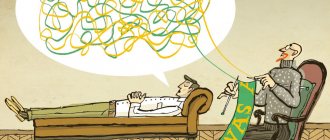Leadership concept
Leadership is a system of functioning of a social group in which there is a specific leader in the group.
This person organizes others, makes key decisions, acts as an authority, and is able to lead.
He takes responsibility for making decisions that are important to all members of the group. At the same time, other participants recognize his authority and listen to his opinion.
The concept of leadership is actively used in psychology, management, sociology, political science and other disciplines. For this reason, there are many approaches to studying this phenomenon.
Experts have also developed several different classifications of the types of this phenomenon.
Scenarios for the manifestation of informal leadership
Idealist - what kind of person is this?
Psychologists, in the process of studying leadership in production teams, have identified several scenarios for the manifestation of this phenomenon:
- Situational. Given a favorable combination of circumstances and personal interest in a particular situation, each person can one day demonstrate leadership qualities.
- Career. This scenario is chosen by those who seek to occupy a leadership position in an organization. In this case, the leader can choose both honest and dishonest ways to achieve his goals. He can act on the sly, deceive.
- Command. This scenario assumes the presence of several informal leaders in the team. Based on the similarity of personal characteristics, they team up and develop a short outline for solving production problems. In most cases, a team leadership scenario has a positive impact on the performance of the entire enterprise as a whole.
Signs
The presence of a leadership system in a group is evidenced by the recognition by the majority of its members of the authority of a person.
This person makes decisions, organizes activities, and bears responsibility. The main characteristics of a leader:
- Foresight . He knows how to predict the development of events and convince others of the correctness of the chosen strategy.
- Thoughtfulness . He always approaches solving any problems calmly and judiciously, without fuss or hasty conclusions.
- Ability to understand people. He understands the essence of man, his inherent weaknesses and strengths. This helps to objectively assess everyone’s abilities and use these abilities as competently as possible in the common cause.
- Activity . This position is very difficult emotionally, since responsibility is always a source of stress. The leader must be physically and psychologically resilient, only in this case the burden placed on him will be feasible.
- Determination .
Failures do not become a reason to abandon your ideas, but are perceived as useful lessons on the way to achieving your goals. Facing difficulties does not confuse you, but only stimulates you to look for ways to overcome them. - Subsequence . People feel comfortable only when the reality around them is predictable and stable. It is the ability to build a correspondence between the chosen strategies, the techniques used and the achievement of expected results that is the key to the trust of group members. The inconsistency and variability of the leader always causes the destruction of any community.
- Justice . A team or social group will trust someone who treats everyone around him equally, without exception. The presence of favorites and close associates always leads to a deterioration in the psychological climate in any group.
- Cool mind. Decisions often have to be made on the spur of the moment to save the overall idea, but they can infringe on the rights of individuals. Often you need to sacrifice less in order not to lose more. Excessive emotionality and softness do not benefit a leader, who must always be guided by rational considerations.
Read about the causes of conflicts in organizations and ways to prevent them here.
The main character traits of a leader
The main character traits of a leader include:
- control over behavior and emotions;
- positive vision;
- resistance to stress;
- readiness for change;
- confidence in success;
- clarity in expressing thoughts;
- readiness to overcome difficulties;
- ability to manage time wisely;
- ability to persuade;
- ability to conduct constructive dialogue.
A leader is a strong personality who is able not only to solve problems and overcome difficulties, but also to foresee them in the future.
Functions
The main functions that a leader performs in a social group:
- predict the development of events and take measures to develop an action strategy,
- to take responsibility,
- set tasks for group members,
- distribute responsibilities according to the abilities of each participant,
- provide moral and practical support in solving problems,
- motivate to achieve high results,
- strives to achieve common, rather than personal interests,
- in case of failure, bear responsibility for the mistakes made.
Personal qualities of a political leader
In a highly simplified form, leadership is understood as the mechanism of interaction between the leader and his subordinates. Political leadership can be viewed as a person's ability to get others to do something. To do this, he must have a number of such qualities:
The ability to identify and formulate the vital interests and goals of society, propose a program, forms, methods and means of their implementation, mobilize and unite people around the identified interests and goals;
- the ability to have a sufficient degree of intelligence, organizational skills, intuition, political will to power and influence to reach the pinnacle of power and remain there, the ability to quickly adapt to a new situation and make decisions appropriate to the given situation
- ability to embody fundamental national values for a given historical period
- the ability to find and make the best policy decisions that correspond to the realities of society.
- The ability to take responsibility for decisions of critical importance to the country, as well as for their results, both positive and negative.
- The ability to persuade, to arouse enthusiasm, to force a nation to overcome pessimism and all sorts of inferiority complexes, to get people behind it, to evoke optimism and belief in a better future. Determination, honesty, awareness of his demands by society are essential qualities of a leader. His moral character attracts attention and plays an important role in his success or failure. The talent to attract people, to be right, to win their sympathy, oratory and a sense of humor are also necessary.
The irreplaceable qualities of modern political leaders in the information society are also the authenticity of photographs and television, good appearance, the ability to inspire trust, etc. In other words, a leader must have charisma in the eyes of others.
Charisma (from the Greek charisma - divine gift, grace) means that a person is exceptionally gifted. The legitimacy of such a leader is supported by the (often blind) faith of his followers in his infallibility. The important thing here is not that he said something right, but that he said it. Charisma consists of the actual abilities of a leader and the qualities that his followers give him.
The leader and his entourage must meet the requirements of the time. He is the promoter of an idea capable of capturing the spirit of society or a significant part of the population, profiting from the most unfavorable positions, turning opponents into allies, not being afraid to take risks, overcoming unforeseen complications, maneuvering, being prepared for temporary setbacks.
His authority, political and personal qualities are strictly assessed by people and largely determine the success of political activity. It is success that forms the basis on which belief in the legitimacy of the leader in the eyes of the governed is formed.
In life, especially in politics, there are often cases when uncompromising adherence to a principle without taking into account possible consequences leads to unforeseen and irreparable consequences. For an experienced politician there must be exceptions to every rule and principle. Thus, at all times, rulers and even political thinkers have defended the permissibility of lying in the name of strengthening the existing system and considered lying forever as an acceptable means of politics. Examples proving the correctness of this reasoning can be found in many cases both in the history of all peoples and states, and in relations between states in the modern world.
Formal and informal
All experts tend to divide leaders into two types: formal and informal.
A formal (nominal) person who occupies a certain social status or position, according to which he is endowed with certain powers of authority.
These are managers at various levels : heads of departments, managers, directors, etc. Such people bear personal responsibility for mistakes made by their team. Their task is to organize work and achieve set goals.
Informal (real), a person who is respected and valued by all members of the group not because of his status or position, but because of his inherent moral qualities. Such a person has intelligence, charisma, charm.
He is always a strong and positive person who inspires confidence and calm in others. He is able to influence group members and direct their activities.
What is the difference?
A formal leader always acts within the framework of the powers with which he has been given . If his professional qualities correspond to his position and are complemented by high moral characteristics, then such a leader can have real power over the team.
If the level of his professionalism does not inspire confidence in his subordinates or his personal qualities interfere with the establishment of a positive psychological climate in the team, then the function of the leader remains only nominal.
Members of the group will obey such a person only within the framework of the duties they perform , but there will be no talk of any recognition of authority here.
An informal leader has the ability to influence other group members due to his business and personal qualities.
In the workforce, the real representatives of power, as a rule, are experienced specialists with a high level of knowledge of their duties.
In addition to professionalism, these people demonstrate self-confidence, reliability, and responsibility. They are also always charming, sociable, and fair. Such an informal authority has much more power than a real leader.
This is explained by the fact that in an organization with a full-fledged acting leader who enjoys the respect of his subordinates, an informal leader cannot, in principle, appear.
Formal and informal leadership, what does it mean and what is the difference:
Reaction
The last block is about the reaction to various kinds of destructive phenomena that act against the basic values of the company, and therefore have a detrimental effect on the moral climate in the team.
Familiarity
When a manager and subordinate get too involved in their friendship, they risk overstepping boundaries. In this case, the manager should always remember that he is a manager (even during joint drinking and partying), and strictly prevent going beyond the border, which he must delineate for himself.
Disrespectful statements and actions
This is unacceptable and extremely destructive. This is what poisons the atmosphere in the team. Stop this as soon as you hear/see it. And don’t forget to figure out the reason afterwards. You need to understand whether there is personal hostility or work conflict behind this behavior. We need to understand and promote this in order to prevent the recurrence of such situations. For example, it happens that people cover up their own mistakes with the mistakes of other people or departments. Developers blame testers, testers blame developers. Often this happens because people simply do not know what the neighboring department does and do not appreciate its contribution to the common cause. You can work with this, for example, by creating channels to communicate the successes of departments, so that employees understand who is doing what in the company and what their contribution is.
Gossip
The appearance of rumors is always a consequence of lack of information. Lack of information is a kind of vacuum that is filled with impurities. Having learned about the existence of some rumor, the manager should explain as truthfully as possible how things really are, and after that think about creating normal channels for conveying this kind of information: mailings, digests, regular seminars, etc.
Not long ago we had a similar story at Badoo. The business decided to transfer part of the development from Moscow to London - a normal business requirement, as time shows, justified. But this gave rise to a rumor that the Moscow office was closing. This idea was so deeply ingrained in the minds of many employees that we had to make a lot of efforts to dispel the rumor. Just imagine the motivation of the people who believed in this: “Why make any plans if we will soon be closed anyway?”
Features of a figurehead leader
Such a personality is characterized by the following characteristics:
- Appears and disappears depending on circumstances . This happens during various transformations, crises, etc. For example, a change in formal leadership can lead to either the emergence of a real leadership role or the abolition of the need for it. The leaders themselves may also change depending on the prevailing circumstances.
- Can interact effectively with other leaders. Often in a social group there are several people who occupy key positions.
At the same time, their spheres of influence do not overlap in any way, and joint efforts are directed towards achieving a common goal. It is this kind of effective interaction that often produces truly significant results. - Dedicated to the common cause. Coordinates the actions of team members to achieve assigned goals. Interested in the integrity of the team and the effectiveness of its activities. He uses his influence and authority not for the purpose of achieving personal interests, but solely for the purpose of solving common problems.
- Internally he loves to manipulate people. Whatever good intentions guide the actions of the informal leader, he does not choose his position by chance. This is always a person who likes to have power over other people and influence the course of events. For this reason, real leaders often dream deep down of becoming formal leaders, since this will give them official powers.
List of used literature
1.Ushakov K.M. Organization development: in search of adequate theories. - M.: September, 2004. - 192 p.
2. Frolov S.S. Sociology. Textbook. For higher educational institutions. M.: Nauka, 1994 - 256 s.
3. Frolov S. S. Sociology of organizations: Textbook. M.: Gardariki, 2001. 304 p.
4. Anton Milekhin Is it worth firing a “nuisance” informal leader? https://hh.ru/contents/publication.do?publicationRubrikId=52&publicationId=704
5.Platonov Yu.P. Structure and conditions of leadership www.elitarium.ru
Similar works
Authority, leadership and power in management.
Problems of leadership and authority of the manager in the team of a foreign trade organization
Authority, leadership and power in management.
Analysis of authority, leadership and power in management in order to improve the efficiency of the management system in the organization
Authority, leadership and power in the management of an organization 2
THE RELATIONSHIP BETWEEN COHESION AND TRUST IN SMALL GROUPS AND INFORMAL SUBGROUPS
Social and psychological characteristics of leaders and managers
Leaders and types of leaders. Leader's image
Merger of daughter and mother and its consequences for the marriage and family relationships of the daughter
The role of a real leader
A real leader can perform several different roles:
- ",Conductor", .
Fulfills the task assigned to him by the leadership, which does not strive for excessive democracy. Builds relationships in the team in accordance with the course set by his superiors. It is important for him to realize his own importance due to the need experienced by management for his help. He is distinguished by his diligence and friendliness, thanks to which he slowly but surely moves up the career ladder. - ",Shirt-guy", . A sociable and charming person who easily gains the trust of individual members of the team. With the help of a positive attitude, which he infects other people with, he sets up his colleagues to perform initially tedious and routine tasks with enthusiasm. Enjoys the feeling of being on the same level with leaders.
- ",Eminence grise", . A secretive and slightly boring person who prefers to act quietly and efficiently. He is happy to be formally on the sidelines, fully aware of the real importance of his position. Such secret power gives him pleasure. Pays attention to little things and nuances, thanks to which he always finds an approach to any person. An excellent manipulator and first-class strategist.
- ",Rebel", . He chooses his position as an unspoken leader only because of the desire to influence the masses in order to organize a rebellion. The purpose of his activity is to set conditions, fight for the rights of the disadvantaged and other aggressive actions that are in no way directly related to the real goals of the group. He fights for the sake of fighting itself, and the final goal is secondary.
Role of an informal leader
Management, as a rule, always distances itself from its subordinates: the director’s office is located far from the production workshop, and the director communicates with subordinates only when necessary. Therefore, the director does not have the opportunity to regulate and control the processes of developing interpersonal relationships within the team of workers.
Important! An informal leader of a team can act in different psychological roles. The main roles of leaders are the rebel, the gray cardinal, the shirt-guy, and the conductor.
Rebel
A leader in this role knows how to say the right phrase at the right moment. This is a fighter for justice. He is inclined to prove his case to his superiors in a dispute. Sometimes he provokes a rebellion, defending someone's interests. The team becomes attached to him, as he is ready to stand up for any employee.
Attention! If it happens that a leader quits due to a conflict with management, those for whom he was attractive may quit after him.
Eminence grise
Such a person is well versed in psychology: all his actions are a subtle calculation. Often the gray cardinal chooses a wait-and-see tactic: he watches his colleagues and superiors, analyzes, and chooses those who are more susceptible to pressure. He can cause confusion in the team while remaining in the shadows. He accomplishes his tasks with the help of other people.
Eminence grise
Shirt guy
The essence of this leadership scenario is the generation of many ideas. Such a person is loved by the team for his sociability, charm, sense of humor, and optimism. His suggestions and ideas are received with enthusiasm by his colleagues.
Important! A distinctive feature of this leadership role is the person’s ability to communicate on equal terms with both colleagues and management.
Conductor
The leader-conductor is the right hand of the director. The director conveys information to employees through the conductor, and at the same time learns from the leader what the team's reaction to this information was.
Attention! A leader-conductor is a good organizer. However, he has little understanding of management, so he prefers to be an assistant to official management.
Who is a leader and what is leadership
Leader from English leader - leads.
Imagine a bus (life) rushing along the road (time), but there is no driver. And if no one is driving, the bus is still rushing, but it’s not clear where. So the leader is the person who got behind the wheel. He took responsibility, he chooses the path and the final route.
You need to understand that if you don’t get behind the wheel of a bus, it will still rush forward, because life’s time is ticking. And you are still responsible for where you arrive. Only you will not arrive where you want.
Even if you are a passenger, you are still responsible for where you arrive, since at any moment you can transfer to another bus going on a different route with which you are on the same route. Either buy your own car and go along your own personal route, or buy your own bus and take fellow travelers (like-minded people).
How to develop leadership qualities
As a rule, it is he himself who prevents leadership from emerging in a person. Or rather, its internal barriers. Barriers can be psychological, for example, internal deep-seated beliefs. In the case of a teacher, he is 100% convinced that he cannot earn money by working as a teacher, and he does not even realize that he is limiting himself .
If you have similar problems, read the article: “Development of a leader’s personality - an example of solving problems with money,” there are examples of how such barriers work and how they can be removed.
Or the barrier may be in the form of psychological complexes, for example, excessive shyness; a person cannot speak in public, and without this skill one cannot become a leader .
Or a person experiences irrational fears, that is, in making decisions he is stopped by an internal monologue in his head, what if something goes wrong, what if something happens. A person who is afraid to make a decision also cannot become a leader.
In most cases, in order to overcome some kind of barrier, it is suggested to break yourself, to break yourself over the knee. For example, still go on stage and speak in public, even if the person is shaking with fear.
But why not act smarter, why doesn’t anyone want to choose a different development strategy: for example, remove the barrier. Psychotechnology to get rid of these psycho-complexes once and for all is in this book.
It’s a mistake to force yourself to do something, forcing yourself for a long time will not work, barriers need to be removed, and not waste energy on overcoming them. Ideally, there should still be a deep, essential motivation. For leadership there must be an understanding of one's mission in life, an understanding of its meaning . Examples for discovering the meaning and purpose of life are in this article.
It is critically important to discover exactly your goals and meanings, which emotionally resonate in your body, cause a surge of strength, and emotional uplift . Do not confuse this with what the “matrix” imposes on us, successful success, money, expensive clothes, and under the Soviet Union this was the construction of communism.
How to become a leader - an example from life
Remember the widely publicized case with Dmitry Medvedev, when some teacher complained to him about his low salary. Dmitry Anatolyevich replied: “A teacher is not a profession, a teacher is a calling. And if you need money, go into business!” This is a significant difference between a leader and an ordinary person.
The leader builds his own life, and does not wait for handouts from the state. It doesn’t even occur to him that someone will earn him money; he is truly convinced that he himself will build his life as he wants.
And this teacher is a complete nonentity if he suffers from lack of money. What example does he set for children by begging? Not to be independent? Not taking responsibility for your life into your own hands? Below I will give an example of how a professional teacher can easily make money.
A leader is a person who does not depend on anyone, does not ask for anything, decides everything himself and does not depend on the assessment of others. But there is an important point: a leader must rely on other people.
How to get people to support him? A leader must be useful both for himself and for others in order to eliminate the so-called “crab effect.”
Help on what the “crab effect” is:
If you put one crab in a bucket of water, it will come out without difficulty. If you put several crabs, then as soon as one starts to crawl out, the rest will cling to it and throw it back, that is, everyone will die .
What would I have done if I were in the place of the teacher who complained to Dmitry Anatolyevich? After all, at the mere mention that I wanted to go into business, my colleagues would attack me. They would say:
- Why do you need this? After all, there is no stability there, the salary here is small, but stable;
- Business is dangerous;
- What if it doesn’t work out, what to live on?
That is, they would exhibit the same “crab effect”.
I would start by maximizing my teaching skills, that is, techniques and teaching methods that would give results close to 100%. After the methods were identified and worked out, I would start tutoring in parallel with my main job. For example, preparing schoolchildren for the Unified State Exam.
Since my methods and techniques had already been honed, the percentage of admission to top Moscow universities for my students would be close to 100%, and word of mouth would instantly spread this news among the parents of future graduates.
Now think about how much parents of graduates would be willing to pay if they were sure that their child, after my training, would be admitted to any Moscow university with a 100% guarantee? I think my income would increase significantly, especially since I can teach schoolchildren from other regions without leaving home, via Skype.
In this way, I would combine my calling with business, and eliminate the “crab effect,” since I would receive support from the school’s parent committee, because they are extremely interested in the success of their children in life, and I can help them with this, and guaranteed.
The technique of how to combine your calling with income growth is in this article: “The practical benefits of understanding the meaning of life and your purpose.”
Thus, leadership is the ability to achieve your goal, and at the same time help others, and not complain about life .
Advice for an aspiring leader
- Determine the destination (where the bus is going);
- Determine what qualities are needed to achieve this goal. What you should become. Determine your role in achieving the goal. (Learn to become a driver, or become a manager and hire a professional driver).
- Determine what prevents you from achieving your goal. Remove obstacles;
- First, learn to subordinate yourself to your goal, to do this, determine your ideal future (where to go), make a plan to achieve it (bus route).
- Break the plan into subplans and small tasks and tie it to a timeline. The output should be a schedule of actions towards an ideal future.
- Track the obstacles in your path, and look for the causes of these problems in yourself. Because you will not be able to influence external circumstances, you will be able to influence your qualities.










